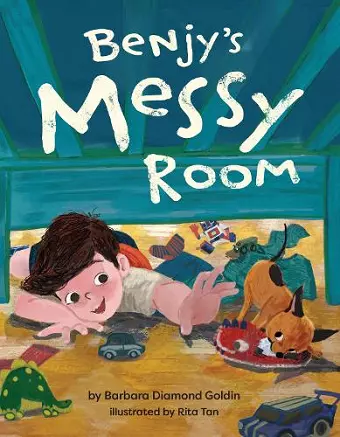Benjy's Messy Room
Barbara Diamond Goldin author Rita Tan illustrator
Format:Hardback
Publisher:Behrman House Inc.,U.S.
Published:28th Mar '24
Should be back in stock very soon

"Chametz hunting meets sibling bonding in this cute and informative read." —Jewish Book Council
"The book provides a useful starting point for thinking about how to approach a problem that seems overwhelming." —Association of Jewish Libraries
Passover starts tomorrow, and Benjy's room is a mess. His race car set, his superheroes, and his firetruck are spread across his room, along with all his other toys. He knows he needs to clean them up, especially with Passover and the breadcrumb hunt starting tonight. But it's much more fun to have a pretend hunt with his little sister, Shira. Benjy crumbles up pieces of paper to be the crumbs. He hides one under his race car, and under his firetruck, and all around his room. They get so caught up in the game, Benjy doesn't notice it was almost sundown. Now he'll never finish in time! That is until he realizes that cleaning might not have to be a chore.
This story about making chores fun, and the bonds between siblings, introduces readers to bedikat hametz, a fun pre-Passover ritual in which families hunt for bread crumbs throughout the house on the night before Passover.
This sweet family story illustrates the traditional requirement to remove all leaven, even crumbs, from the house the night before Passover starts. Removal is performed after dark by the light of a candle, with a specific prayer and the antique implements of a feather and spoon. In this story, middle child Benjy wants to hold the candle and lead the hunt. To do so, he must clean up his bedroom floor, which is covered with toys. Older sister Naomi taunts him, telling him he will never get the chore done in time. Baby sister Shira cries because everyone in the household is so busy preparing for the holiday that they’ve left her with no playmates. Benjy agrees to play with her before he starts to clean. He creates a mock breadcrumb hunt using paper balls.
While his baby sister eagerly wanders about his room finding them, he sings the blessing, which she learns from repetition. As it gets dark, they use a flashlight. Their chants summon Naomi back to the room, where she discovers that Shira knows the prayer. Not only that, she’s been picking up Benjy’s toys as she’s searched for the fake breadcrumbs. Naomi agrees to help finish cleaning so Benjy can lead the hunt. The story ends with Benjy getting his wish and the loving family celebrating together. The endnote explains chametz, a word not included in the story itself.
While this picture book is clearly for Jewish readers who are familiar with Passover, the endnote captures the universal themes of being overwhelmed by a big chore and getting into a holiday mood. Chametz hunting meets sibling bonding in this cute and informative read. —Ellen G. Cole, Jewish Book Council
When this picture book begins, Benjy’s room is too messy for tonight’s b’dikat chameitz, a pre-Passover tradition of searching for breadcrumbs explained accessibly in the text; the Hebrew term is identified in the author’s note. Younger sister Shira is looking for someone to play with her, so Benjy — though he feels he doesn’t have time since his room needs cleaning — invents a game of searching for paper balls around the room to help Shira practice for tonight. While young readers learn about b’dikat chameitz from this activity, they also have the chance to pick up on the way the game is helping to solve Benjy’s original problem.
The book provides a useful starting point for thinking about how to approach a problem that seems overwhelming, an aspect also addressed in the author’s note. A mix of full-bleed illustrations and vignettes provides variety.
Benjy’s Messy Room is recommended for classrooms and collections serving primary readers and their families. —Shoshana Flax, Association of Jewish Libraries
If only Benjy can put away all his toys, he’ll get to lead his family’s hunt for chametz on the evening before Passover. It’s Benjy’s favorite ritual where he’ll hide small packets of bread crumbs that his family will have to find. To Benjy’s surprise, when he gets distracted playing with his younger sister, he discovers that turning the chore into fun is the perfect solution. —Jewish Telegraphic Agency
ISBN: 9781681156309
Dimensions: unknown
Weight: unknown
32 pages